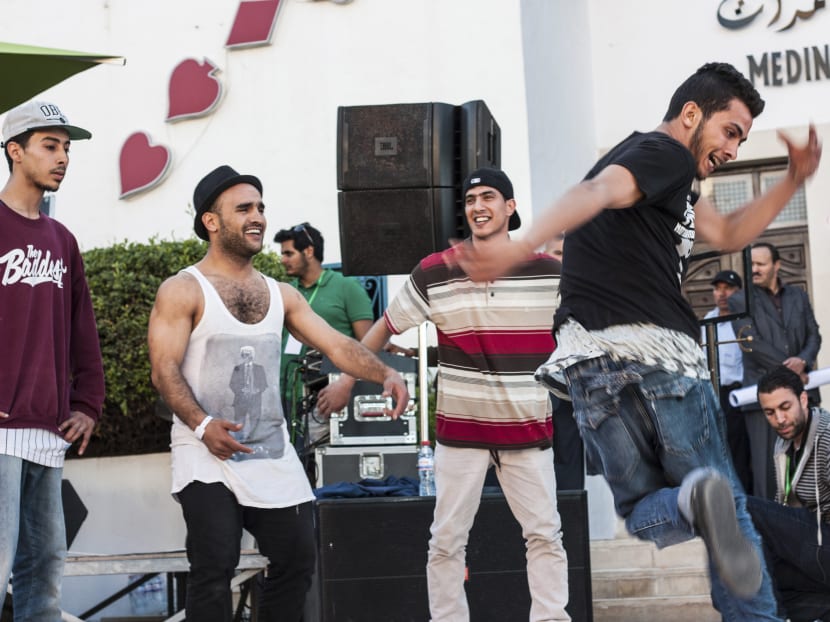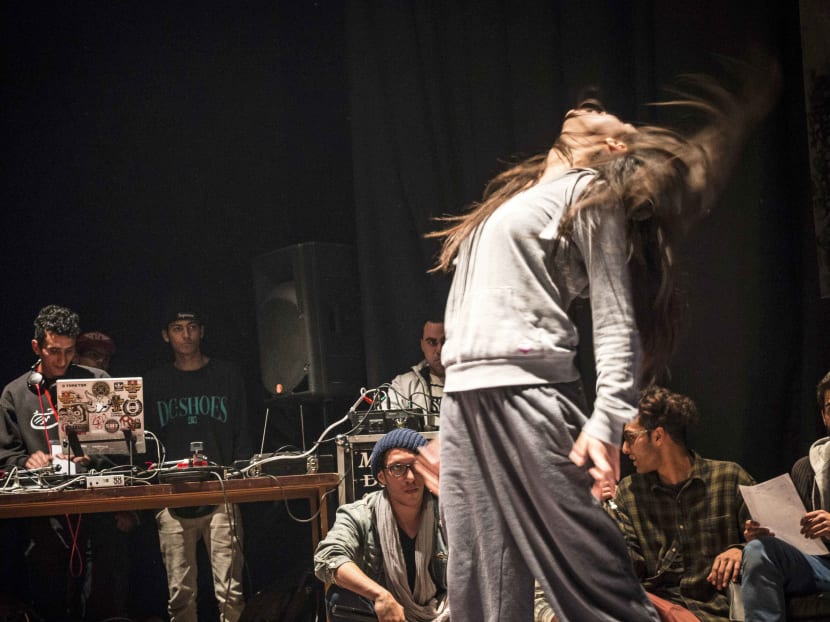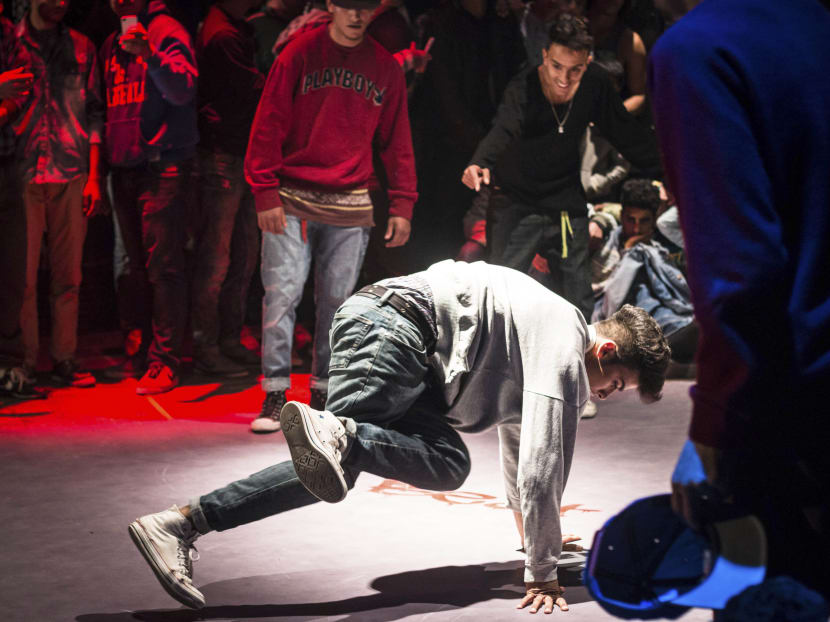Tunisia’s neglected youth find their voice in hip hop, rap
TUNIS (AP) — On the roof of a concrete building in an impoverished Tunis neighborhood, hip hop beats pound out from a PC hooked up to cheap speakers.



TUNIS (AP) — On the roof of a concrete building in an impoverished Tunis neighborhood, hip hop beats pound out from a PC hooked up to cheap speakers.
Under graffiti-daubed cloth, young men in sweatpants and baseball caps breakdance, popping and locking robotically to the rhythm thumping around them. Rappers from local hip hop group Zone 5 snarl back and forth lines they’ve just written about police, poverty and smoking pot.
Zone 5 rapper Mohamed Ayari and other Tunisian youth are getting out their message of rage about life on the fringes in post-revolution Tunisia through a perhaps surprising channel: hip hop.
“You see what the system does? We write a graffiti message up on the wall and they call it ‘provocation’ and the police come after us. But why do they call it provocation?” the 23-year-old said during a break in rehearsals for an upcoming show. “It’s because we’re pointing out their faults, their weaknesses. No one wants to hear about their weaknesses.”
Since overthrowing its long-ruling dictator in 2011, Tunisia has had a string of elections and is being hailed as “the success story” of the region. But the new men in charge look very much like the old ones, with an 88-year-old president and ministers that all cut their teeth in previous administrations. Despite spearheading the revolution, Tunisia’s youth are still feeling sidelined, and one of the few ways they are getting their voices heard is through rap — shouting to anyone who will listen that all is not well in Tunisia.
An attack on the national museum on March 18 by two young Tunisians from working-class neighborhoods that killed 22 people, mostly tourists, has once more sounded the alarm about the future of young people in the country.
Tunisia’s parliamentary elections last fall saw reasonably high voting rates. But the youth turnout was abysmal, with over 80 per cent of Tunisians between 18 and 25 boycotting the ballot. Unemployment, already high at 15.5 per cent, soars to 42.3 per cent for young people, according to Eurostat figures from 2011.
The most sinister indication of youth disillusion with the system: the 3,000 Tunisians, nearly all in their 20s, who the Interior Ministry says have left to fight with the Islamic State in Syria, Iraq and lately, Libya.
Nakasaki Dali, a member of Zone 5, said in his neighborhood, youths either become rappers or take refuge in ultra-conservative Islam.
Just down the hill from Tunis’ seat of government, where young people rallied for change four years ago, is the rundown neighbourhood of rapper Ahmed Ben Ahmed, known as Klay BBJ. His lyrics of resistance and rage are hummed by kids walking through streets choked with mopeds and garbage.
In his raps — which jump nimbly between literary Arabic and Tunisian street dialect — Ben Ahmed talks about the issues that concern young people the most: police oppression, the lack of jobs and being scapegoated by the wealthy for the country’s ills.
It is the police — called “the ruler” in his neighbourhood — who bear the brunt of his raps. Police under the country’s former dictator were reviled in Tunisia as the oppressive arm of a corrupt system — a role activists and urban youth say they continue to play in poorer neighborhoods. The movement to use rap to protest against the system started during the dictatorship, largely as a reaction to police brutality.
Around the corner from Ben Ahmed’s house lives 16-year-old Zied Sellimi, who said he was recently picked up with a group of young people after one of them insulted a police officer.
“I have two brothers who are always in jail,” said Sellimi, adding that his father is dead and mother has no work. “It was only a month ago that I myself was taken into the police station.” There, he said, he and his friends were slapped around and insulted.
Not far away, Adel Bouhamdi works under the light of a single bare bulb in a closet-sized shop repairing mopeds. On the sidewalk lay two half-assembled scooters.
“Rent’s gotten expensive, you know. And these days the cops won’t leave me alone, always coming and demanding I show them the papers I have for the shop,” he said, gesturing at his grim surroundings with disgust. “There’s no money to make from a shop like this.”
International human rights groups say police abuses include arbitrary detentions, beatings and torture, overcrowded prisons and the denial of due process.
“I blast the police because they’re the stick that the system beats us with,” said Ben Ahmed, sitting in his mother’s home in front of a half-built computer blasting music, as he peered out from under a baseball hat with “Chicago” splayed across the front. “Here, even with a lawyer, you get beaten by the cops and mistreated. If you’ve got money or know people inside the administration, you don’t get hit.”
Ben Ahmed has had his own brushes with police. He was arrested in August 2013 after he performed the anti-police rap song “Boulicia Kleb” (The Police are Dogs) with fellow rapper Weld El 15 at a concert in the resort town of Hammame
While Weld El 15 went into hiding after the initial arrest, Ben Ahmed was jailed for several weeks for insulting police. He was released only when authorities felt the pressure of a campaign for his liberation.
In the minds of older Tunisians, however, the police are seen as the guardians of order after the years of post-revolution turmoil. The support of most voters for veteran politician Béji Caïd Essebsi as president was clearly motivated by a desire for stability.
The one thing all Tunisians can agree on is the perilous economic situation, with annual inflation of 5.5 per cent and few jobs. Once again, it has been worst for young people, who exist on the margins of an economic system with few opportunities.
In his 2012 song “Work, Freedom, National Dignity,” Ben Ahmed highlighted how the youth are frustrated in their search for jobs and respect from authorities. The song’s video is a grim depiction of riot police attacking protesters with dogs, as a chained-up Ben Ahmed raps feverishly in front of a list of political parties.
So far, the solution hasn’t come for the young people through elections. The choice is between Islamists and nationalists who generally have similar policies that have never served the urban poor.
Teenagers like Sellimi see little hope in the country’s politics, especially with the election of an octogenarian as president.
“Beji won’t help us, I’ve seen him on TV three times already and he hasn’t said anything about the youth,” he said. “We need a president that takes from the rich, not steals from the poor.” AP






